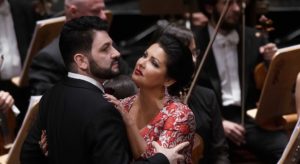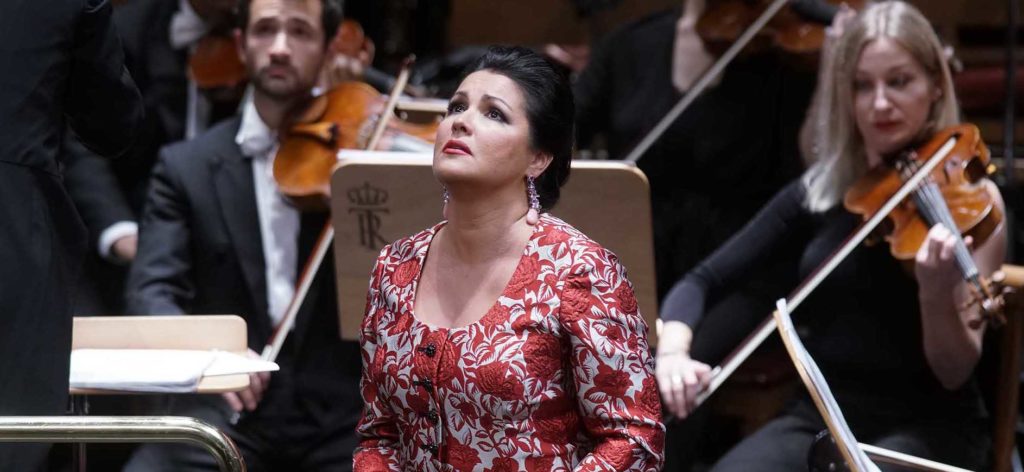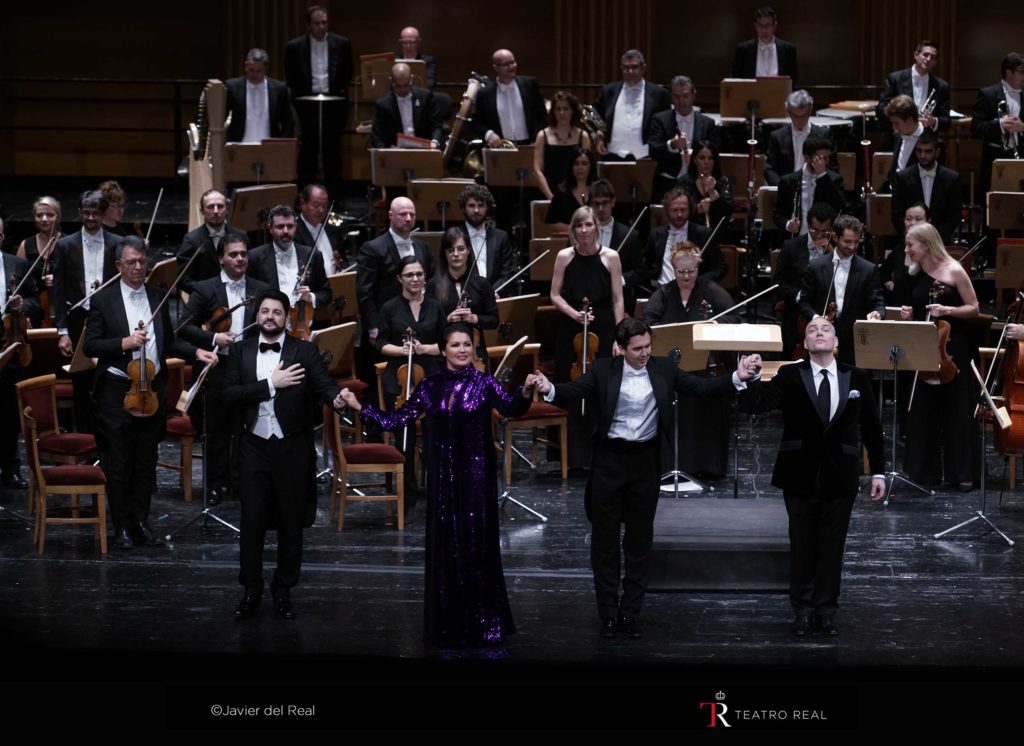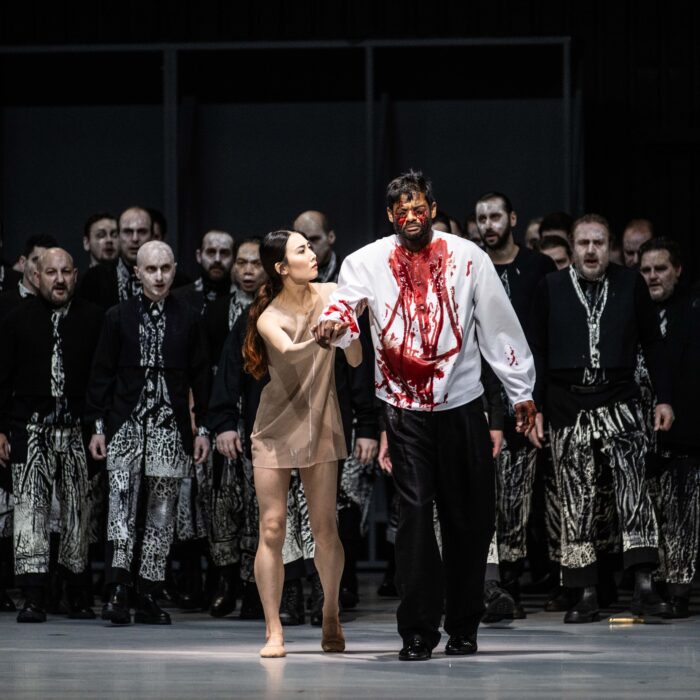
Teatro Real de Madrid 2019-20 Review: Anna Netrebko & Yusif Eyvazov In Concert
Christopher Maltman Steals The Show In A Bizarre & Ultimately Disappointing Concert Performance
By Mauricio VillaThere were high expectations surrounding the return of superstar Anna Netrebko to the Teatro Real were she had participated in Prokófiev’s “War and Peace” in 2001.
The result was a mixture of excitement and disappointment: Firstly, there was the usual imposition of her husband Yusif Eyvazov in the program, a good singer who does not reach the quality and artistic standards of the Diva.
Secondly, there was the unannounced presence of the British baritone Christopher Maltman who surprised with his dark velvet timbre, wise vocal line, and perfect style.
However, the third reason for this mix of hype and disappointment was the strange program which featured music of Verdi, verismo, and then some other odd additions and only one encore. Moreover, the positioning of some of the musical selections was haphazard and lacked a sense of flow or build.
Verdi
Netrebko’s voice is a miracle, and throughout the night of the concert she proved that she was in top form. In recent years she has developed a questionable wobble on her tope notes lately, but on this night, her voluminous sound filled the theatre with well sustained high notes, well projected and covered low notes (it is incredible the power of her low notes without switching into chest resonance), exquisite pianissimos, and immaculate legato lines.
The concert began with the Eyvazov and Netrebko singing “Già nella note densa” from Verdi’s “Otello.” It is to be determined whether Eyavzov has the color or the vocal potency to portray the iconic Verdi character, but it is true that they chose the most lyrical part from the opera, where the orchestration is not heavy and both vocal lines do not go higher than A flat. As such it seemed a perfect piece to warm up the voices. Netrebko showed her magical ability to do diminuendi and pianissimi during the long legato phrases, especially “e quanta speme ci condusse ai soave abbracciamenti;” here she sang “sempre dolce” as marked in the score, always paying attention to the dynamics as written. However, Eyvazov did not follow the score as closely, singing most of his lines forte, including the conclusive A flat in “ Vien, venere splende,” which is written with a clear and effective diminuendo. The two were always in character and interacting with each other.
The duet was followed by the overture from “Nabucco,” played by the orchestra of Teatro Real with enthusiasm and rhythm with conductor Denis Vlasenko relying on reinforcing the bombastic and colorful qualities of the music, which includes the theme from the famous chorus “Va Pensiero.”
Then came what to my opinion was one of the best moments of the night: Netrebko’s interpretation of “Tu che la vanità” from Verdi’s “Don Carlo.” Her pure lyrical voice suits the score perfectly in an aria where she could shine in the low register and on the several high B flats. She delivered long legato phrases in mezza voce and even showcased some well-sustained pianissimi notes like in “Se ancor si piangi in cielo.” Her timbre is so grateful, her volume so powerful and her diminuendi so suspended that you must surrender to her vocal power. Her acting was not as appropriate however. Without the benefits of scenic or dramatic context, her moving side to side in worried stance did more for her showing off her luxurious dress than deepening our connection with Elisabetta’s pathos.
The first solo intervention by Eyvazov was “Oh! Fede negar potessi” from Luisa Miller where he showed secure singing in the passagio zone and solid singing above middle F. The difficulty of this aria lies mostly on the breath control as the tessitura is quite affordable for a tenor (a couple of A naturals during the recitative and a few A flats in the aria), and Eyvazov accomplished it quite well, giving some extraordinary bravura moments during “Oh! Fede negar potessi.” Unfortunately, the aria “Quando le sere placido” felt fixed as the conductor drastically accelerated this passage and Eyvazov seemed to struggle a bit with the breathing every four bars of the lengthy legato lines.

(Credit: Javier del Real)
The Baritone Arrives
Christopher Maltman then appeared for the first time with Macbeth’s aria “Pietà, rispetto, amore” and he surprised the audience with his round timbre and his seamless register from low to high. His voice is modest in volume but singing a concert with the orchestra behind you helps you project. This sad and pathetic aria also relies on never-ending long phrases, most of them going to high F, which is an uncomfortable zone for a baritone. Maltman’s interpretation of the old, remorseful Macbeth was mesmerizing, always adequately in style and with a perfect Italian diction.
It seemed strange that the orchestra played the overture from “I Vespri siciliani” when the next piece was a duet from “Macbeth.” So, why break the obvious order of the program? If we might guess that the diva needed more rest, why did they not place the overture after Luisa Miller and leave all the fragments from “Macbeth” together? From a stylistic standpoint, it is also an odd choice as Macbeth is an early Verdi work while “I Vespri sicilliani” comes from a more mature period.
Netrebko and Maltman continued with the short duet “Ove son io?” from Act three of “Macbeth.” Lady Macbeth has been one of Netrebko’s signature roles and she proved why in these four minutes. She darkened and colored her voice to astonishing effect, creating a manipulative and Machiavellian queen. She rejoiced in the several descents to the lower register, which was sonorous and covered on such phrases as ”Or riconosco il tuo coraggio antico;” there was fantastic attack of the initial A natural to low C as well as the ascension to two high B flats and the conclusive high C. Again it seems rather odd that she decided to sing such a short duet, rather than “Regna il sonno su tutti” from Act one, but it became even weirder she decided to ignored her previously announced aria “La luce langue” and they went straight into the “Trovatore” trio. Stranger still was the fact that she changed into a sparkling purple sequin dress in lieu of singing the programmed aria.
The first part ended with the Act one trio from “Il trovatore,” which was a good climax. While Eyvazov gets the short romanza “Deserto sulla terra” but Netrebko has a few phrases to show off her vocal power before the frenzied final stretta. All the difficulty of this piece lies on the baritone who has to deal with an uncomfortable high tessitura, several high F sharps, and the rage that he has to portray without losing vocal control. Maltman’s performance was impressive, hitting the auditorium with his powerful high F sharps, and representing the character without losing the vocal line.
One More Verdi Before Verismo
The second part began with the duet “Invano Alvaro ti celasti al mondo” from “La Forza del destino” (the only Verdi piece left for the second part) which showed the trouble that Eyvazov has with the low register as he struggled to go down to low B flat on “io mi postro al vostro pie.” That said he showcased his greatest strength here – his high notes. which are in fact the best of his voice, with generous ascensions to well-sustained high B flats on “L’amo ancor, e sèlla m’ama” and “Udite.”
Netrebko continued with her second highlight of the night, the interpretation of the famous aria “Ebben? Ne andrò lontana.” Wearing a third different dress and sparkling jewerly, the diva gave the best demonstration of what her voice could do, with a moving interpretation and impeccably balanced timbre from low to high, coronating the end with a secure and voluminous high B natural. This aria proved why she is one of the best artist in the opera world today.
Eyvazov’s interpretation of “Mamma, quell vino è generoso” from Cavalleria Rusticana was disappointing. The secure and beautiful high B flat that closes the aria in “Si io non tornasti” did not compensate for his melodramatic interpretation, full of old fashion mannerisms while trying to obtain a dark dramatic sound that he doesn’t possess. The orchestra of Teatro Real gave an inspiring reading of the famous intermezzo from the same opera.
Then came another oddity in the program: the short duet “Lippen Scheweign” from “The Merry Widow.” It seemed like an excuse for the diva to dance a waltz with the baritone and showing how her dress could fly. However, Lehar’s flighty music, like the opening Verdi duet, did not match the second part, dedicated to Verismo opera. It played like some kind of joke, and a moment for the soprano to rest from the more intense music to come.

(Credit: Javier del Real)
The tenor then interpreted “E lucevan le stele” from Puccini’s “Tosca.” The difficulty of this aria is the interpretation: to be able to portray a desperate man condemned to death who does not want to die and not fall into mannerism or melodrama; this is exactly what Eyvazov did. The tessitura of the aria is quite central, with two A naturals and an insistence on the passaggio. Eyvazov was vocally correct. He tried to do a diminuedi on the phrase “Oh dolci baci,” which resulted a poor mezza voce rather than finishing in a pianissimo F sharp. He was more successful in “le belle forme disciogliea dai veli,” with the diminuedo to an impeccable piano high A natural. He tried to sound desperate on the phrase “E muoio disperato” but he did not have the color or the volume to make this high G effective.
The next solo aria was the famous “O mio babbino caro.” The tessitura is quite central in general and the aria is short. Netrebko’s interpretation allowed her gorgeous timbre to shine and she displayed an ability to do soaring pianissimo on the high notes. She did, however, go over the top when she decided to hold the last high A natural forever, breaking the fluidity of the melody. There are lots of arias and cadenzas where you can sustain high notes for several bars or refrain the cadenza, but it is a questionable decision to make this fermata much longer than usual as it goes against the music. It came off as vocal showboating.
The concert ended with fragments from Giordano’s “Andrea Chenier,” beginning with the baritone’s aria “Nemico della patria.” Maltman had to to stop abruptly due to a siren going off, so he decided to restart the aria, receiving the first standing ovation of the night for his immaculate performance.
The last piece on the program was the ending duet “Vicino a te” where Netrebko and Eyvazov gave themselves over to the inspiring heroic melodies of Giordano and the bombastic high B naturals that both characters sing before walking to the guillotine. Eyvazov tried once more to sound spinto or dramatic while his wife overshadowed him completely with her torrent voice and secure high notes. It was an exciting ending because of Giordano’s effective composition.
Then after a deserved standing ovation of three minutes, the audience received the one and only encore that the trio gave: their own version of “Oh! Sole mio” where the soprano danced from one side of the stage to the other playing with the fullness of her dress and imitating the game “The Three Tenors” once did by adding a trill on the refrain. Honestly, it came off as a bit of an afterthought and the audience seemed to expect more encores. However, after another standing ovation of five minutes, the trio left the stage saying goodbye. The audience just left.
There is no doubt that Netrebko’s voice is a miracle, and she has the ability to do beautiful pianissimi. However, when you pay an excessive amount of money to hear the diva of the moment, the least you can expect is to hear her sing. It is clear that Eyvazov is a must in this concert, but adding a baritone (who happened to be the best interpreter of the night) to minimize your stage time in addition to designing your program to feature arias where you take no risks, is the ultimate disappointment.


